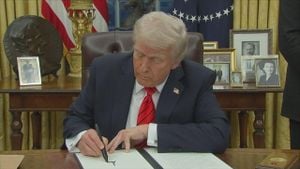The debate over the taxation of Spain's newly approved minimum wage (SMI) has intensified, showcasing deep divisions within the coalition government. Podemos, anticipating the discontent from the left and seeking to protect low-income earners, has proposed legislation to exempt the SMI from Personal Income Tax (IRPF) entirely. This move follows the PSOE's controversial decision to impose taxes on minimum wage earners for the first time, setting off alarm bells among progressives.
On Tuesday, Podemos registered their proposition at the Congress of Deputies, aiming to modify the existing IRPF law to prevent tax withholdings for those earning the minimum wage. Ione Belarra, the leader of Podemos, expressed her outrage, calling it "an absolute scandal" for the government to impose taxes on those earning the minimum wage, especially when it coincides with tax breaks for large energy companies. Belarra stated, "It is a democratic scandal and a bad joke for the most vulnerable. People earning the minimum wage should not be made to pay taxes. This is not only unjust but counterproductive, erasing the benefits of the wage increase approved by the government."
The new minimum wage, which is set to increase to €1,184 as of January 1, 2025, was met with applause from various sectors for its potential to aid struggling workers. Yet the decision by the Ministry of Finance, led by the PSOE, not to adjust the IRPF thresholds has been met with fierce criticism. "This implies hundreds of thousands of workers will see their disposable income depleted due to tax withholdings," stated Belarra, emphasizing the irony of taxing the least wealthy during financially taxing times.
Adding to the complexity, Sumar, another leftist group within the coalition, has echoed Podemos's initiatives, announcing their own proposal aimed at ensuring the SMI remains tax-exempt. A spokesperson remarked, "We've observed how the new SMI will be taxed, creating unnecessary pressure on those already earning the least." They argue not only for the benefit of workers but as part of advocating for broader tax reform, promoting a more progressive tax system to lessen the burden on those with lower incomes.
The sentiment across left-wing factions reflects concern about the income disparity intensified by the government's tax policy. Gabriel Rufián, spokesperson for ERC, also expressed concern over this taxation decision, urging the ministries involved to resolve their differences quietly rather than publicly. He highlighted the detrimental impact on those receiving the SMI, and added to the growing chorus asking for solidarity among coalition partners to arrive at equitable solutions.
On what could be perceived as the other side of the equation, PSOE leaders, including spokesperson Patxi López, maintained the perspective of fiscal responsibility, arguing, "The taxes we collect directly support public services everyone uses. This is not about punishing those earning the minimum wage but ensuring equitable contributions across all income levels." This defense suggests the PSOE is committed to maintaining the integrity of fiscal collection as they publicly downplay claims of internal conflicts.
The strategic maneuvering unveils the increasingly acute struggle for influence between Podemos and the PSOE. Reports indicate both Podemos and Sumar, measuring their alliances carefully, might find unexpected support from the PP, as conservative factions also raise their voices against taxing low-income earners. The PP's willingness to back these initiatives poses challenges to the PSOE's position, especially since the unity among opposition forces against their fiscal strategies appears to resonate well with voters who are increasingly frustrated by the rising cost of living.
Further complicity is found with the backdrop of public reception; citizens who benefit from the minimum wage are beginning to feel the pinch of taxes, stirring grassroots activism aimed at holding the government accountable for perceived inequities. The criticism increasingly suggests officials should reconsider taxation policies, not only to lessen the burden on workers but also to align with progressive standards observed across much of Europe.
Critics argue this tax initiative presents what they describe as "an anomaly" within Spain's fiscal policies, especially when compared to other EU nations such as France and Belgium, where minimum wages are exempt from income tax. Catherine Martinez, from Sumar, described it starkly: "This is about protecting livelihoods. We must not allow tax policy to exacerbate inequalities as the cost of living continues to soar for the working class.”
The upcoming parliamentary face-offs promise to be decentralized and contentious as all parties align their strategies for influencing fiscal stability for workers. Each faction is poised to mobilize constituents against perceived injustices as the political season heats up, uniting various leftist and some right-leaning factions against PSOE's handling of the matter.
The political crisis may serve as a wake-up call to adapt fiscal structures before they disenfranchise those they aim to support. With factions rallying around the core message of protecting low-income workers from undue fiscal pressure, the fallout from this debate could reshape how future policies address minimum wage earners.



